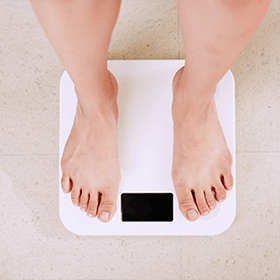By Dr Adam Simon
Diet Versus Exercise for Weight Loss: Can You Outrun Your Calories?
Have you ever wondered how much exercise you'll need to do to work off that bag of crisps? We've got the answers.
Weight loss is often viewed as a simple equation. If you burn off more calories than you consume, you'll end up with a positive result, surely?
It's this attitude that leads many exercise enthusiasts to think they can get away with eating anything, as long as they pay their penance in the gym (or on the track) the next day.
But is eating or exercise more important when it comes to weight loss and can you really outrun a bad diet? In this guide, we'll find out.
Attitudes
A 2008 survey by the Food Standards Agency found that 30 per cent of men and 24 per cent of women believed it was possible to eat whatever you wanted, as long as you did plenty of exercise to offset it.
Since it's known that exercise burns off energy you intake via food, this is something of a common sense view to take, but the reality of the relationship between working out and eating healthily is a lot more complex.
Mythbusting
A 2015 article in the British Journal of Sports Medicine aimed to set the record straight on the issue, stating that while useful for maintaining good health and reducing the risk of cardiovascular disease, diabetes and dementia physical activity did not promote weight loss.
In the past 30…years, as obesity has rocketed, there has been little change in physical activity levels in the Western population. This places the blame for our expanding waistlines directly on the type and amount of calories consumed, said the authors.
The paper went on to claim that this attitude was perpetuated by companies in the food industry, who pushed a message that it's OK to consume unhealthy stuff, as long as you did exercise to offset it.
Members of the public are drowned by an unhelpful message about maintaining a 'healthy weight' through calorie counting, and many still wrongly believe that obesity is entirely due to lack of exercise, it said.
This view was supported by a 2011 paper, which tackled the 'energy balance equation' the view that calories in have to equal calories out for successful weight loss.
In fact, the factors governing energy intakes influence the energy balance far more powerfully than the factors determining resting energy expenditure, the authors concluded.
Underestimating
It seems this common misconception is compounded by the fact that people vastly underestimate the amount of exercise needed to burn off the unhealthy foods they consume.
In its call for 'activity-equivalent labelling' last year, the Royal Society for Public Health (RSPH) claimed many people found nutritional information confusing on packaging and suggested this be replaced with symbols that showed the amount of exercise it'd take to burn off various foods.
And the sheer amount of exercise you'd need to engage in to offset some common favourites is remarkable. For instance:
- A sugary soft drink (138 calories): Around half an hour of walking or about 15 minutes of running
- Chocolate bar (229 calories): Over 40 minutes of walking or 20 minutes of running.
- Crisps (171 calories): Half an hour of walking or 15 minutes' running.
- Muffin (265 calories): Nearly 50 minutes of walking or a 25-minute run.
- Chips (460 calories): 40 minutes' cardio or nearly an hour of weightlifting.
Obviously, you're going to burn some calories just by going about your day, but these figures are shocking nonetheless. After all, you could wolf down a bag of chips in five minutes, but are you really prepared to put in nearly an hour's hard work to burn it off?
Is exercise irrelevant in weight loss?
While people overestimate the impact of diet on weight loss, that's not to say it's completely irrelevant. If your diet is poor and you want to lose weight, changing the food you eat will have a much bigger impact than simply hitting the gym.
Exercise is still important in maintaining general good health and will definitely contribute to long-term weight loss when you've sorted your diet out, but given how difficult it is to work off food you should firstly ensure you're making the most of your daily calorie limit by packing plenty of healthy, nutrient-dense foods into your meals.
And You?
If you've got any experiences with the balance of diet and exercise or want to ask us any questions about this contentious issue be sure to leave a comment below or get in touch via Facebook (or Twitter). We always love to hear from you.
And if you're looking for expert advice on weight loss or general nutrition, simply hit the button below to talk to an experienced, UK-based GP right now:

